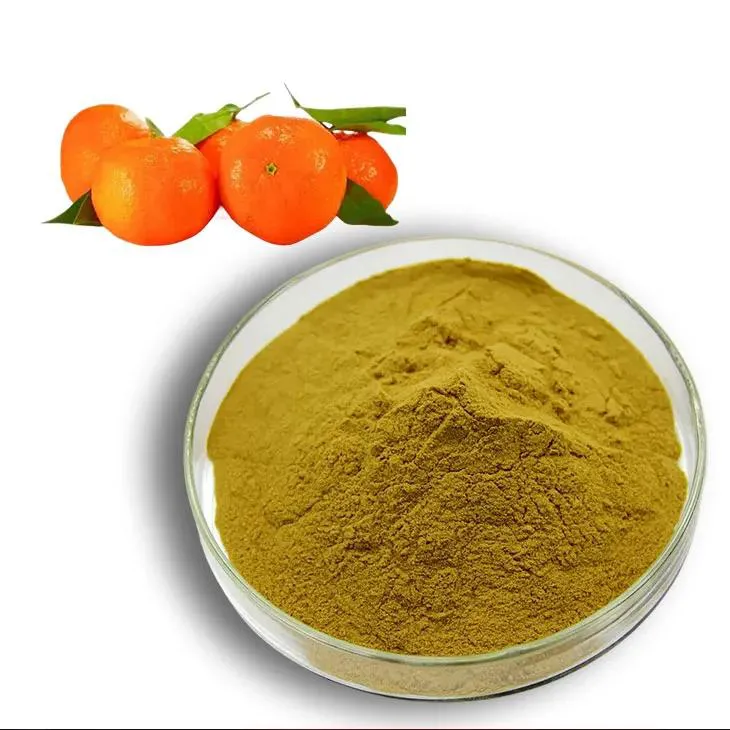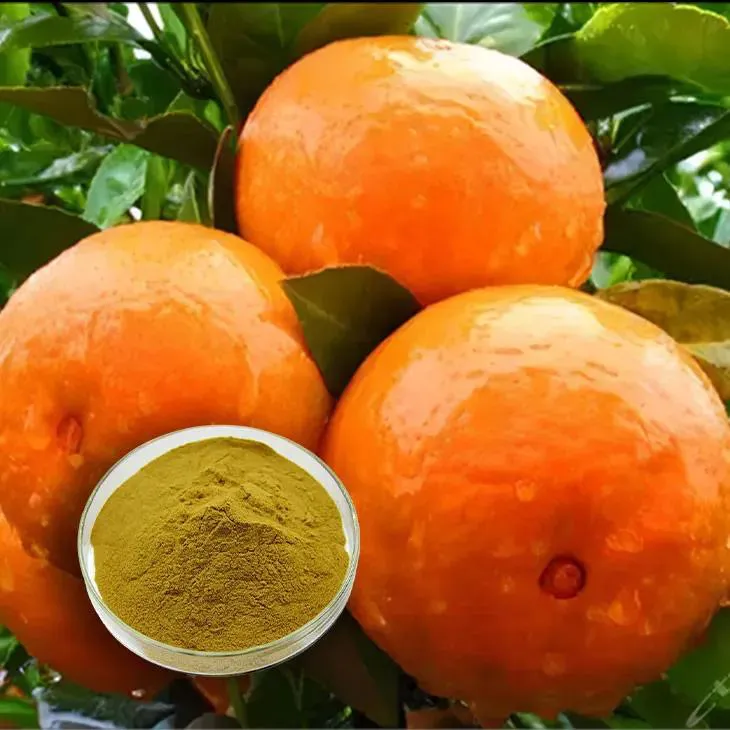- 0086-571-85302990
- sales@greenskybio.com
Citrus bioflavonoids: Benefits, uses and possible side effects.
2024-11-13

Introduction
Citrus fruits, such as oranges, lemons, and grapefruits, are not only delicious but also rich in various nutrients. Among these nutrients, citrus bioflavonoids play an important role. These compounds are often overlooked compared to more well - known vitamins and minerals in citrus fruits, but they offer a wide range of potential health benefits, have diverse uses, and, while generally safe, may also have some possible side effects that are worth exploring.

What are Citrus Bioflavonoids?
Citrus bioflavonoids are a group of plant - based compounds that are found in the peel, pulp, and membranes of citrus fruits. They are polyphenolic substances, which means they contain multiple phenolic rings in their chemical structure. There are many different types of citrus bioflavonoids, including Hesperidin, naringin, and Quercetin (which is also found in other plants). Each type may have slightly different properties and functions within the body.

Benefits of Citrus Bioflavonoids
1. Antioxidant Activity
Citrus bioflavonoids are powerful antioxidants. They work by neutralizing free radicals in the body. Free radicals are unstable molecules that can cause oxidative stress, which is linked to various health problems such as aging, heart disease, and cancer. By scavenging these free radicals, citrus bioflavonoids can help protect cells from damage, reduce inflammation, and potentially slow down the aging process. For example, Hesperidin has been shown to reduce oxidative stress markers in animal studies.
2. Cardiovascular Health
- Blood Pressure Regulation: Some citrus bioflavonoids may help in regulating blood pressure. For instance, Hesperidin has been found to have a vasodilatory effect, which means it can relax blood vessels and improve blood flow. This can contribute to a reduction in high blood pressure, a major risk factor for heart disease.
- Cholesterol Management: They may also play a role in cholesterol management. Naringin, found in grapefruit, has been shown to potentially lower LDL (bad) cholesterol levels while increasing HDL (good) cholesterol levels in some studies. This balance is crucial for maintaining a healthy cardiovascular system.
- Anti - platelet Activity: Citrus bioflavonoids can inhibit platelet aggregation. Platelets are blood cells that clump together to form blood clots. Excessive platelet aggregation can lead to the formation of dangerous blood clots that can cause heart attacks or strokes. By reducing platelet aggregation, citrus bioflavonoids can help prevent these thrombotic events.
3. Immune System Support
Citrus bioflavonoids can enhance the immune system. They can stimulate the production of white blood cells, which are the body's defense against infections. Additionally, their antioxidant properties can protect immune cells from oxidative damage, allowing them to function more effectively. For example, Quercetin has been studied for its potential to boost the immune response during cold and flu seasons.
4. Anti - Inflammatory Effects
Chronic inflammation is associated with many diseases, including arthritis, diabetes, and certain cancers. Citrus bioflavonoids possess anti - inflammatory properties. They can inhibit the production of inflammatory mediators in the body, such as cytokines and prostaglandins. This can help reduce inflammation in various tissues and organs, providing relief from inflammatory conditions.
5. Skin Health
- Anti - Aging: The antioxidant activity of citrus bioflavonoids can benefit the skin by reducing the damage caused by free radicals. This can lead to a reduction in wrinkles, fine lines, and age spots, promoting a more youthful appearance.
- Skin Protection: They can also protect the skin from environmental damage, such as UV radiation and pollution. By strengthening the skin's antioxidant defenses, citrus bioflavonoids can help maintain the integrity of the skin barrier.
- Wound Healing: Some studies suggest that citrus bioflavonoids may accelerate wound healing. They can promote the proliferation of skin cells and the formation of new blood vessels in the wound area, which are essential for the healing process.

Uses of Citrus Bioflavonoids
1. In Dietary Supplements
Citrus bioflavonoids are often included in dietary supplements. They are available in various forms, such as capsules, tablets, and powders. People may take these supplements to boost their overall health, especially if they do not consume enough citrus fruits in their diet. For example, individuals with a high risk of cardiovascular disease may take citrus bioflavonoid supplements as part of a preventive strategy.
2. In Functional Foods
- Some food manufacturers are adding citrus bioflavonoids to functional foods. For instance, orange - flavored drinks or yogurts may be fortified with these compounds. This allows consumers to obtain the benefits of citrus bioflavonoids in a convenient and tasty way.
- They can also be used in the development of new food products with specific health claims. For example, a cereal product targeted at promoting heart health may contain citrus bioflavonoids.
3. In Cosmetics and Skincare
- Citrus bioflavonoids are finding their way into cosmetics and skincare products. They are used in creams, lotions, and serums. In skincare products, they can help improve the appearance of the skin by providing antioxidant protection, reducing inflammation, and promoting collagen synthesis.
- Some haircare products may also contain citrus bioflavonoids. They can help strengthen hair follicles, reduce hair loss, and improve the overall health of the hair.
Possible Side Effects of Citrus Bioflavonoids
1. Interaction with Medications
- Grapefruit bioflavonoids, in particular, can interact with certain medications. For example, they can interfere with the metabolism of some drugs, such as statins (used to lower cholesterol) and some anti - arrhythmic drugs (used to treat heart rhythm problems). This interaction can lead to increased levels of the drugs in the body, potentially causing adverse effects.
- It is important for patients taking medications to consult their healthcare provider before taking citrus bioflavonoid supplements to avoid any potential drug - supplement interactions.
2. Allergic Reactions
Although rare, some people may be allergic to citrus bioflavonoids. Allergic reactions can range from mild symptoms such as skin rashes, itching, and swelling to more severe symptoms like difficulty breathing and anaphylactic shock. Those with known allergies to citrus fruits should be cautious when using products containing citrus bioflavonoids.
3. Gastrointestinal Disturbances
- In some cases, high doses of citrus bioflavonoids may cause gastrointestinal problems. These can include nausea, vomiting, diarrhea, and abdominal cramps. It is recommended to follow the recommended dosage instructions when taking citrus bioflavonoid supplements to avoid these issues.
- People with pre - existing gastrointestinal conditions, such as irritable bowel syndrome, may be more sensitive to the potential gastrointestinal side effects of citrus bioflavonoids.
Conclusion
Citrus bioflavonoids offer a plethora of benefits, from promoting cardiovascular health and supporting the immune system to enhancing skin health. Their uses are diverse, spanning dietary supplements, functional foods, and cosmetics. However, it is important to be aware of the possible side effects, especially when it comes to interactions with medications, allergic reactions, and gastrointestinal disturbances. As with any natural compound, further research is still needed to fully understand all aspects of citrus bioflavonoids, but they hold great promise as a natural source of health - promoting substances.
FAQ:
What are citrus bioflavonoids?
Citrus bioflavonoids are a group of compounds found in citrus fruits such as oranges, lemons, and grapefruits. They are natural substances that contribute to the color, flavor, and health - promoting properties of these fruits.
What are the main benefits of citrus bioflavonoids?
Citrus bioflavonoids offer several benefits. They have antioxidant properties, which can help protect the body's cells from damage caused by free radicals. They may also support the immune system, improve blood circulation, and have anti - inflammatory effects. Additionally, some studies suggest that they could be beneficial for heart health and may help in reducing the risk of certain chronic diseases.
How are citrus bioflavonoids used?
Citrus bioflavonoids are used in various ways. In the field of health, they can be consumed as part of a diet rich in citrus fruits or taken as dietary supplements. In the beauty industry, they are added to products like creams and lotions due to their potential antioxidant and anti - aging properties. They may also be used in the food and beverage industry as natural flavor enhancers and preservatives.
What are the possible side effects of citrus bioflavonoids?
While citrus bioflavonoids are generally safe, some people may experience side effects. High doses may cause gastrointestinal issues such as nausea, vomiting, or diarrhea. In rare cases, allergic reactions may occur, especially in individuals who are allergic to citrus fruits. It's also important to note that citrus bioflavonoids may interact with certain medications, so it's advisable to consult a healthcare provider before taking supplements if you are on other medications.
Can citrus bioflavonoids be obtained from sources other than citrus fruits?
Most citrus bioflavonoids are primarily sourced from citrus fruits. However, some other plants may also contain similar compounds, but the concentration and types may vary. But for the typical citrus bioflavonoids, citrus fruits remain the main source.
Related literature
- Citrus Bioflavonoids: Chemistry, Pharmacology, and Therapeutic Applications"
- "The Role of Citrus Bioflavonoids in Health and Disease"
- "Citrus Bioflavonoids: A Review of Their Potential Benefits for Skin Health"
- ▶ Hesperidin
- ▶ Citrus Bioflavonoids
- ▶ Plant Extract
- ▶ lycopene
- ▶ Diosmin
- ▶ Grape seed extract
- ▶ Sea buckthorn Juice Powder
- ▶ Fruit Juice Powder
- ▶ Hops Extract
- ▶ Artichoke Extract
- ▶ Mushroom extract
- ▶ Astaxanthin
- ▶ Green Tea Extract
- ▶ Curcumin
- ▶ Horse Chestnut Extract
- ▶ Other Product
- ▶ Boswellia Serrata Extract
- ▶ Resveratrol
- ▶ Marigold Extract
- ▶ Grape Leaf Extract
- ▶ New Product
- ▶ Aminolevulinic acid
- ▶ Cranberry Extract
- ▶ Red Yeast Rice
- ▶ Red Wine Extract
-
Sophora Japonica Flower Extract
2024-11-13
-
Ginger Extract
2024-11-13
-
Citrus Aurantii Extract
2024-11-13
-
Peppermint Extract Powder
2024-11-13
-
Camu Camu Extract
2024-11-13
-
Rosemary extract
2024-11-13
-
Garcinia Cambogia Extract
2024-11-13
-
Chasteberry Extract
2024-11-13
-
Centella Asiatica Extract
2024-11-13
-
Red Date Extract
2024-11-13





















